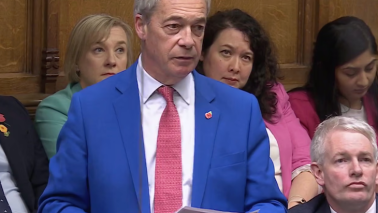In football, a player can be sent off the pitch for violent conduct or ‘using offensive, insulting or abusive language and/or gestures towards another player’. If a footballer attacks another player rather than the ball, they are disciplined. This is an accepted and acceptable approach to a game where passions run high. A similar approach could be applied to the unacceptable abuse of politicians such as Anna Soubry and a number of journalists, over Brexit. Why are standards that are applied on the sports field somehow lost in real life? By all means play the ball (whether that’s Brexit, the EU itself, May’s deal or no deal) with a passion. But if you go for another player, you deserve a red card.
The crowd of angry men protesting at Soubry outside Parliament are extreme physical examples of the Twitter abuse dished out routinely by online trolls. At least one of them appears to be seeking crowdfunding to become a professional political agitator. There are a small number of people being given more exposure than they should. However, politicians need to avoid making their actions seem semi-legitimate – and emboldening them – with warnings of civil unrest if, for example, a second referendum is considered. It is unhelpful to suggest that the threat of violence might be determining Government policy. (To head off accusations of pro-Remain bias, I equally condemn the way in which the Rees-Moggs were harangued on their doorstep. The point is that none of this should be an acceptable way to conduct a disagreement.)
When debates descend into physical and verbal intimidation, we are truly plumbing the depths of emotive black and white politics. There is a fine line between loyalty and blind tribalism. Tribalism can lead us to treat people outside our tribe as worthy of – and responsible for – every calamity that we can imagine, escalated in our minds to a level of desperate wickedness.
Ultimately this is not something that we can fully legislate on. Life is not a football match. There are important debates being held around the extent and limits of freedom of speech versus the importance of protecting individuals from intimidation. But the way that we behave towards one another comes down to individual choices. It is about responsibility and civility. It is about valuing each other’s humanity, respecting opposing views and remembering how to disagree well.
It also means that those of us in the public eye must start to model a more respectful form of political debate. We need to get past the discourse of insults and triumphalism, and to humanise rather than demonise our opponents. Indeed, we should go as far as to seek common ground with our opponents.
There are about 200 Labour MPs and 20-30 Tories, not to mention the Liberal Democrats, who have far more in common with one another than with the leadership of the two big parties. The main thing preventing them from forming another party to challenge them is party tribalism. This is unhealthy politics, especially when our main opposition party is acting, in a term aptly coined by Tory MP Sam Gyimah, as ‘not a Government in waiting but an Opposition in hiding’.
So in the interests of not being tribal, I will say that we need to kickstart this much talked-about new movement that could bring together politicians of different political colours but a common outlook. We need to relegate the extremists to the fringes and move back towards a more civilised politics, where we take care to attack the ball and not the player.






Comments